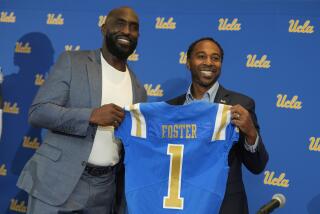Well-Paid Reebok Chairman Faces Cut
- Share via
One of the nation’s highest-paid executives--Reebok International Chairman Paul Fireman, who earned $14.6 million last year--might make as little as $1 million under a new compensation package that the footwear company announced Thursday.
Other companies--from L.A. Gear to Walt Disney--have also taken steps to alter fat compensation packages for top executives, which have drawn the ire of some employees and stockholders. “It could be a possible reaction to making a lucrative salary,” said Donald Lowman, manager of compensation practices for TPF&C;, a management consulting firm.
Fireman’s annual compensation has been a source of friction with stockholders in the past. His new five-year employment contract, which begins in 1991, might reduce those tensions by linking his compensation more closely to the fortunes of stockholders and might even attract investors who were once irked at the size of Fireman’s pay, analysts say.
“It’s always been a sore point with shareholders,” said Steven B. Frankel, a securities analyst at the brokerage firm Adams, Harkness & Hill. “Now he is in the same boat as shareholders.”
During the past four years of his current employment agreement, Fireman has earned an average of $13.6 million, which was derived mostly from a bonus determined by the footwear company’s pretax profits. His base salary was $357,200.
Fireman’s bonus soared as Reebok’s pretax profit grew from $78 million in 1985 to $291 million last year. He took the No. 5 spot on Business Week magazine’s list of the nation’s highest-paid chief executives in 1989. Topping the list was Craig McCaw, chairman of McCaw Cellular Communications, who earned $53.9 million in salary, bonuses and stock options.
“When (Fireman’s salary) package was first initiated, I don’t think they expected the company to become quite as profitable and as large as it has,” said securities analyst Elizabeth A. Armstrong at Prescott Ball & Turben, a brokerage firm.
Similar employment agreements and explosive growth at rival footwear maker L.A. Gear also resulted in stellar salaries. One of L.A. Gear’s executives--Elliot J. Horowitz, the former chief financial officer, who made $5.2 million--quit late last year when the company scrapped the compensation plan in favor of stock options.
Under the new agreement with Reebok, Fireman’s base pay will be limited to $1 million annually and his potential bonus to another $1 million. However, his income could still soar well beyond $2 million because of Reebok’s decision to grant him options to buy 2.5 million shares of company stock over the next five years. Fireman and his wife already own 14.5% of Reebok common stock.
In an unusual but increasingly used feature, Fireman will have to buy the stock at an 18% premium above the current Reebok share price. Most such stock-option agreements allow executives to buy company shares at a discount.
“This really puts a little more performance (pressure) on him,” said Lowman at TPF&C.; “The stock value has to go up by some amount that allows the shareholders to benefit before the executive benefits.”
In a similar arrangement, the most recent compensation package for Walt Disney Co. Chairman Michael D. Eisner--who has also ranked as one of the nation’s highest-paid executives--will force the entertainment executive to wait for the stock price to rise to a certain level before he can exercise any options.
While factors outside a manager’s control might affect stock price, “there tends to be a long-term correlation between earnings growth and stock price,” said Steve Mendelsohn, director of compensation at William M. Mercer Inc., a human resources and compensation consulting firm. “You are trying to tie the compensation of the chief executive to that of the owners.”
More to Read
Inside the business of entertainment
The Wide Shot brings you news, analysis and insights on everything from streaming wars to production — and what it all means for the future.
You may occasionally receive promotional content from the Los Angeles Times.









